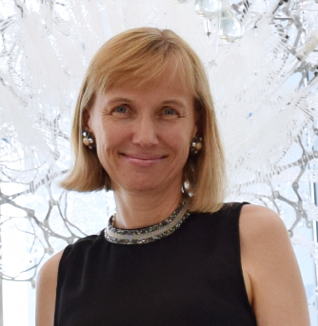
Data Visualization Literacy
| Katy Börner | VIS 2019 Talk |
In the information age, the ability to read and make data visualizations is as important as the ability to read and write. This talk introduces a theoretical data visualization framework (DVL) meant to empower anyone to systematically render data into insights using temporal, geospatial, topical, and network analyses and visualizations. Exemplarily, the DVL is applied to (1) Map science and technology, see interactive data visualizations from the Places & Spaces: Mapping Science exhibit (http://scimaps.org) and recent PNAS special issue on Modelling and Visualizing Science and Technology Developments (https://www.pnas.org/modeling). (2) Design reference systems and user interfaces within the Human BioMolecular Atlas Program (HuBMAP) (https://commonfund.nih.gov/hubmap) that support the exploration and communication of single-cell data—from the subcellular to the whole body level. (3) Teach Visual Analytics (https://visanalytics.cns.iu.edu) to students around the globe.
References
- Börner, Katy, Andreas Bueckle, and Michael Ginda. 2019. Data visualization literacy: Definitions, conceptual frameworks, exercises, and assessments. PNAS, 116 (6) 1857-1864.
- Börner, Katy. 2015. Atlas of Knowledge: Anyone Can Map. Cambridge, MA: The MIT Press.
- Börner, Katy. 2010. Atlas of Science: Visualizing What We Know. Cambridge, MA: The MIT Press.
KATY BÖRNER is the Victor H. Yngve Distinguished Professor of Engineering and Information Science in the Departments of Intelligent Systems Engineering and Information Science, School of Informatics, Computing, and Engineering; core faculty of the Cognitive Science Program; and founding director of the Cyberinfrastructure for Network Science Center (http://cns.iu.edu)—all at Indiana University in Bloomington, Indiana. She is also a visiting professor at the Royal Netherlands Academy of Arts and Sciences (KNAW) in the Netherlands; Visiting Professor and Mercator Fellow in User-Centered Social Media, Department of Computer Science and Applied Cognitive Science, University of Duisburg-Essen, Duisburg, Germany; and Humboldt Fellow, Technology/Media Centre, Dresden University of Technology, Germany. Börner became a Fellow of the American Association for the Advancement of Science (AAAS) in 2012, a Humboldt Research Fellow in 2017, and an Association for Computing Machinery (ACM) Fellow in 2018. Since 2005, she serves as a curator of the international Places & Spaces: Mapping Science exhibit (http://scimaps.org). Börner’s research focuses on the development of data analysis and visualization techniques for information access, understanding, and management. She is particularly interested in the formalization, measurement, and systematic improvement of people’s data visualization literacy; the study of the structure and evolution of scientific disciplines; the analysis and visualization of online activity; and the development of cyberinfrastructures for large-scale scientific collaboration and computation. She holds an MS in electrical engineering from the University of Technology in Leipzig, and a PhD in computer science from the University of Kaiserslautern.